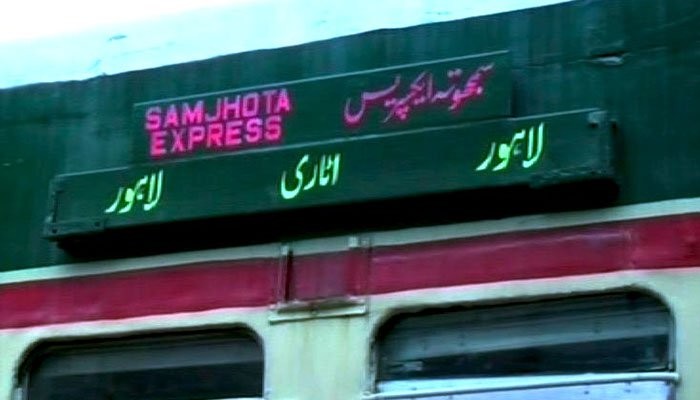Samjhota Express: 12 years on and no justice
March 25, 2019

For Mohammad Sami, a resident of Hyderabad, Sindh, there may be no justice.
In 2007, he lost both his parents, a sister and two brothers in twin terrorist attacks on the Samjhota Express, a bi-weekly train that runs between India and Pakistan. His family was among the 68 people, including 42 Pakistanis, who were mercilessly killed. The Pakistanis were on their way home, after meeting their loved ones in India.
Such is the life of those whose families are divided by a border.
If Sami was hoping for some closure, then Thursday’s verdict must have dashed his hopes. Twelve years later, last week, a special National Investigation Agency (NIA) court in India acquitted the four accused of the bombing.
When I had first interviewed Sami soon after the tragedy for an international wire service, he looked and sounded like a shattered man. “I lost everything,” he told me. “I lost everything in just one incident.”
It is a coincidence, indeed, that the verdict came on a Thursday. Back then, I remember that the first seven bodies were returned to Pakistan also on a Thursday.
When Samjhota Express first chortled between the two arch-rivals, it aimed to bring the people of the two countries closer together. It was to provide a link, a safe passage, to the divided families. Most of the passengers from either side were from the lower and lower middle-class.
The 2007 explosion carried out allegedly by Hindu extremists refreshed the horrific memories of the 1947 partition, when thousands of Muslims were massacred on their way to their new home, Pakistan.
While the verdict was being announced, the Indian court ruled that the prosecution had failed to provide evidence against the accused. This in itself raised serious questions, both on the process of the investigation and the conviction of the prosecution, despite reported confessions from the accused men.
One cannot ignore that the timing of the judgement also coincides with next month's general elections in India. Many believe that the verdict would only help the hard-line BJP narrative while on the stump.
The elections shall pass, but will the families of the 68 victims ever get justice in the world’s largest democracy?
Sami last went to India a few days before the bombing. He never returned to the country thereafter. When I asked him why, he said: “Mazhar sahib, I would never have imagined that within a week my entire life would change this drastically. I will never go to India again, as I have lost all hope for peace and with it any hope to meet my family there.”
Then there is the late Abdul Sattar, also known as Sattar bhai. Sattar was a regular passenger of the Samjhota Express. He came to Pakistan after independence, by train, and was very excited when this train service first began operations. After the bombing, I spoke to him. He told me that the blast was “not merely an attack on the train but on the two countries. These extremists who don't want to see the people of India and Pakistan come close to each other.” (Sattar died a few years ago).
Transportation links between the two South Asian countries, like the Friendship train service and the Friendship bus service, had brought smiles on the faces of millions of divided families. I was in Lahore when they were inaugurated. I was covering at the time the visit of former Indian Prime Minister, the late Atal Bihari Vajpayee, when he first visited Lahore on the Friendship bus in 1998.
Since then, the same feeling was felt this year, when the Sikh community welcomed the initiative taken by the Pakistan army chief and the prime minister by opening the Kartarpur corridor. “It was a great gesture from my friend, Prime Minister of Pakistan Imran Khan,” said the Indian legendary cricketer Sidhu, who attended Khan’s oath taking ceremony.
But tragedies like the Samjhota Express will continue to block the true potential of friendship. Then there is the rise of extremism in India.
Majority of the victims of the train bombing belonged to families divided after the partition. Train service was one economic way of travelling from Lahore to Attari and vice versa.
Tensions spiked between the two nuclear states again this year after the Pulwama attack, which killed 50 Indian soldiers. India accuses Pakistan-based groups of carrying out the attack. Pakistan denies it and has asked for evidence. In the following days, the Indian Air Force intruded into Balakot, by violating Pakistan’s airspace. Pakistan then retaliated within 24 hours and captured a downed Indian pilot, who was later released.
Finally, after some much-needed de-escalation, the till-then suspended Samjhota Express resumed, although with very few passengers. Talks on the Kartarpur corridor also restarted. But peace talks between the two are still not a reality.
The verdict and the acquittal of all the accused named in the train attack disappointed not only the victims' families but also those who want to see peace between the two neighbours.
There is a famous saying, “Injustice anywhere is a threat to justice everywhere.” This is exactly what happened after the painful journey of 12 years for Sami and others like him.
Abbas is an analyst and columnist of GEO, The News and Jang. He tweets @MazharAbbasGEO











